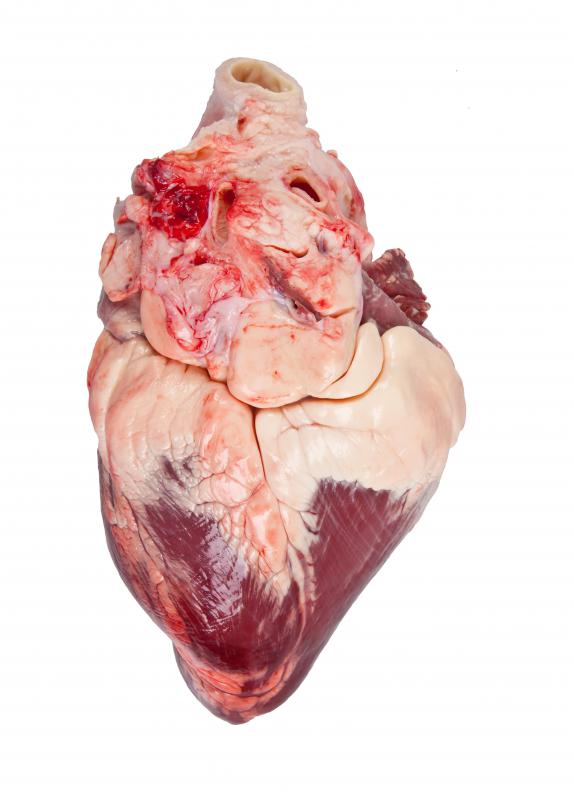At WiseGEEK, we're committed to delivering accurate, trustworthy information. Our expert-authored content is rigorously fact-checked and sourced from credible authorities. Discover how we uphold the highest standards in providing you with reliable knowledge.
What is a Heart Transplant?
A heart transplant is the replacement of a diseased or failing heart with a healthy donor heart provided by a deceased person. Donor hearts are usually taken from people who have opted to donate, have healthy hearts and who are brain-dead. There are far fewer donors than there are people who need transplants. Not all donated hearts can be used due to the condition of the heart at the time of death.
The first successful heart transplant was performed by Dr. Christian Barnard in 1967. In the early days of heart transplanting, survival rate after a transplant was exceedingly poor. It took about two more decades for scientists and doctors to successfully address one of the biggest problems with heart transplants, that bodies of people receiving them tended to reject the new organ. With considerable research in medications that would help reduce organ rejection, survival rates after heart transplant have consistently improved.

Most people who receive heart transplants are under the age of 65 and have significant heart disease or defects that cannot or have not been successfully managed through other surgeries. There are very specific criteria for determining who receives a heart and transplant coordinators must weigh the health of the person needing the heart. Special balance is required because the person usually must need the heart badly, which means they’re very sick, but they also have to be healthy enough to survive surgery for transplantation and the treatment afterward. Treatment after surgery can mean taking anti-rejection medications that take a toll on the body.

Another consideration is the degree to which the donor heart matches the person needing the heart. Finding a heart that the body will not reject can be challenging, and this is one reason why many people wait a long time before receiving a donor heart. Degree of need is measured too. People who are sicker tend to receive hearts sooner if there is a suitable match.

One matching consideration in adults is blood type, but sometimes very young children may receive hearts from people with a different blood type. As people age, they cannot receive these incompatible blood type hearts because their bodies will reject the new organ.
People who may receive a heart transplant also go through complex interviews where ability to care for self, and things like mental stability are determined. In cases where children will receive a heart transplant, families are interviewed and their interviews help to determine eligibility. Doctors always want to be certain that a person receiving a heart or family members caring for this person will be able to comply with all medical demands and instructions to improve survivability.

The actual heart transplant surgery is very complex. The old, sick heart is mostly removed, though generally a small amount of the left and right atria, the top two chambers of the heart, are not removed. The new heart is connected to the atria and to the blood vessels that feed the body and lungs. While the surgeons are removing the old heart people are on heart lung bypass, which circulates blood and oxygen.

Once the new heart is in place, it may need help to begin beating, which is sometimes accomplished through an electric shock. The surgery takes about five hours, but can be longer or shorter depending upon complications or ease of surgery. After surgery, people will require care for many days in the hospital to make sure the new heart continues to function as normal, and to recover from the surgery. People will continue to need significant care and follow-up with their physicians for life.

At present, approximately 70% of people who receive a heart transplant are living five years after the surgery. Survival rates are expected to increase and there is always new information which helps improve this field. For instance in 2008, it was discovered that survival increased for those people who received a donor heart from someone of the same gender. It’s conceivable that some day donors might be matched by gender. At present, the limited availability of donor hearts would make matching by gender unlikely.
AS FEATURED ON:
AS FEATURED ON:

















Discussion Comments
I have nothing but admiration for families who agree to allow their loved one's organs to be harvested. I have a signed donor card, myself.
It's always very touching to go to a transplant unit and see the photos of the donors. Their lives ended, but their generosity enabled others to live longer, healthier lives. Few gifts are more meaningful.
A guy who went to our church had a heart transplant. I think he lived three years afterward. He'd gotten some kind of nasty virus that damaged his heart, which is why he was eligible. He was in his mid-30s when he died. It was really sad. I think it was chronic rejection. I don't know that the new heart ever really worked all that well for him and I don't know why. Not sure the doctors ever figured it out, either. However, the whole transplant field is still pretty new, considering how long people have been practicing medicine.
Post your comments